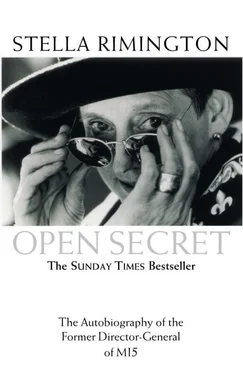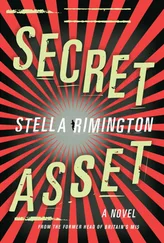After that experience, we acquired an air-raid shelter, a mighty structure of steel plates, which was actually a blast shelter from a quarry. It entirely filled our sitting room but was rapidly absorbed into the family and became accepted as part of the furniture. We could sit up in it, and we had beds in there too. We spent every night in that shelter while the bombing went on. My brother colonised it and used it as a base for his model railway. It made a really satisfactory reverberating sound when hit, and on it I learned the Morse code. Air-raid shelters were a part of life in those days – everyone had one. I used to envy some of my friends who had neat table shelters, which could be much more easily disguised than ours.
They made wonderful hiding places for games at birthday parties, but in fact they must have been horribly claustrophobic in an air raid. Others had Anderson shelters in their gardens, deep dangerous places, which hung around long after the war and often seemed to be full of stagnant, smelly water. The father of one of my friends once used his to drown a family of kittens – an execution which I still remember with horror to this day.
During one night we spent in our air-raid shelter, the houses across the road were landmined. Amazingly, my brother and I must have gone to sleep during the raid and been put into our beds still asleep when it was over. But later in the night our ceilings collapsed and we woke to find our beds covered with dust and to see my mother and father sweeping up the ceiling plaster from the floor. Our windows had all been blown in and the staircase had shifted inches from the wall. I had been delighted when we moved into that house. It was the first house of our own we had had since we left London and I felt that at last we had settled somewhere. When I woke up and saw the state of things I was heartbroken, and according to family legend, I said ‘Oh, look what’s happened to our nice little house,’ and burst into tears.
We lived with the house in that state until towards the end of the war, when the bomb-damage people came to repair it.
Looking back on my early childhood, I realise now how frightened I was for most of the time. After some months spent wide awake in cellars and shelters, listening to aeroplanes and the explosions of falling bombs, I began to shake uncontrollably when the siren sounded and the shaking did not stop until we heard the all-clear. Obviously my experiences came nowhere near the horror of those of many children in Europe during the war. But even what I went through would be thought nowadays to require instant counselling. In those days you just absorbed the experience and dealt with it however you could. I was left with some tangible symptoms of anxiety. In my teens, I began to suffer claustrophobia which lasted for years, even after I was married, and had the effect of making it very difficult for me to sit in the middle of a row at a concert or the theatre or in church. I had to know where the exits were and to have planned how I would get out. If I found myself in a situation where I could not easily get out of a room, I would come out in a cold sweat and start to shake. Perhaps less clearly attributable to the war, I developed a quite pessimistic and anxious personality. I grew up feeling that it was no good having great expectations, nothing in life was going to be easy and there wasn’t much certainty around; so you’d better depend on yourself to make the best of whatever came along. And heaven only knew what that would be.
I suppose I caught that attitude from Father, whose experiences had given him a fairly dour attitude to life. He was a self-educated Yorkshireman, who had obtained his engineering qualifications at night school, after working during the day at Cochrane’s Ironworks in Middlesbrough. He held strong Christian beliefs and taught us that hard work and devotion to duty were the most important things and that they would be their own reward.
When we lived in Barrow, we had a dog called Billy. Actually, when he came to us, from an old soldier who had died, his name was Buller, after General Sir Redvers Buller, the Boer War general, but we renamed him. When Billy died I was heartbroken. As little girls do when their pet dies, I cried and cried and went on crying into the night. I know Father was really sorry that I was so upset, but his reaction was to say in a rather stern way, ‘Well, we shall certainly never have another dog, if this is what happens.’ We never did, and I felt really guilty and silly for being so upset. All my life I have felt that showing emotion is somehow a bit of a weakness. Emotions are what other people are allowed to have and show and people like me are supposed to be strong, to help when others are in difficulties. It’s a very stark philosophy.
Both Father and Mother believed most strongly that you must never give up – there was no place for weakness and above all no time to be ill. Father suffered all the time I knew him from stress-related illnesses, particularly constant nervous indigestion, but he never gave way to them. His experiences during the First World War had been horrific, and he could not be persuaded to talk much about them. He sometimes mentioned his time in the military hospital, recovering from his head wound, which left him with a large depressed fracture of the skull. I think he had been very ill at first, but later he had found being cooped up in hospital very difficult and he talked with some shame about an incident, which must have occurred when he was recovering. Having been woken by the nurse at some incredibly early hour to be washed, he had thrown the washing water at her.
Probably as a result of his head wound, he tended to be anxious and pessimistic. He had some form of nervous breakdown at the beginning of the Second War in 1939, when all the horror of his experiences of the First came back to haunt him. He was kind and took a great interest in his two children, and later in his grandchildren. But he was very conscientious, he always had to work hard and there was not much time or money for relaxation. Perhaps not surprisingly, I do not remember much lightheartedness about him.
Most of the burden of bringing us up and of keeping Father going fell on my mother, who died at ninety-five during 1997. She was a truly stoical person. She believed, and these beliefs were tested almost, but not quite, to destruction during the war, that whatever the circumstances one should remain as cheerful as one possibly could; that one should never complain and that one should try to cause as few problems or difficulties for others as possible. She taught her two children the importance of perseverance. She used to tell us that nothing that is worth doing can be achieved easily, but that at the end of the day you can do no more than your best. When, later on, I used to moan about exams and say, as I always did, that I was going to fail, she used to reassure me quietly and say that nobody could blame me if I tried my hardest, and so of course I did, and I usually passed.
With the end of the war came more peaceful nights and what was remarkable freedom in comparison with the life of present day children. With very little traffic about, we played hopscotch and football in the street and bicycled to school. During the war, playing in the street could be a bit hazardous because bands of soldiers used to come and practise urban warfare in our area, hiding round corners and shooting at each other with blank cartridges.
When they weren’t there we enjoyed our own war games. My brother always wanted to be Rommel, because it meant he could ride around the street on my tricycle, wearing a long overcoat and a cap.
I started school in Barrow at the local infants’ school at the top of our road. I must have been a regular little Southerner when I first went there. On my first day I was asked to read to the class, and they all roared with laughter because I pronounced ‘castle’ as ‘carstle’, whereas they all said ‘casstle’. I soon lost my Southern ways after that, and learned how to speak Lancashire. When my brother went on to Barrow Grammar School, I was sent to a little convent school for girls, Crosslands Convent at Furness Abbey on the outskirts of Barrow.
Читать дальше












